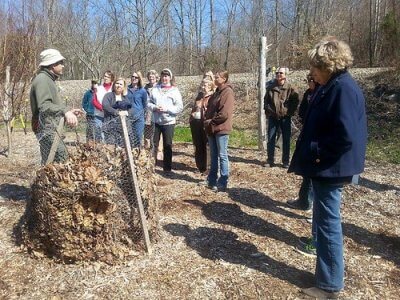Horticultural Therapy – Can a Garden Help Your Mental Health?

By: Abby Lanes
Permaculture expert Geoff Lawton said, “all the world’s problems can be solved in a garden”. Could horticultural therapy even be the answer to mental health issues?
Writer Elizabeth Waddington explores.
What is horticultural therapy?
Steven Davis, the executive director of the American Horticultural Therapy Association, defines it as:
“a process through which plants, gardening activities, and the innate closeness we all feel towards nature are used as vehicles in professionally conducted programs of therapy and rehabilitation.”
Put more simply, ‘garden therapy’, is about getting your hands into the soil and spending time growing food and other plants, often in a communal setting.
How can garden therapy help your wellbeing?
Garden therapy is a wellbeing tool for people of all ages. It’s suggested as useful for issues such as abuse recovery, navigating grief and bereavement, and experiencing palliative care. And you can be a complete novice to benefit, or have experience.
But why exactly is it so beneficial?
1. Nature is now proven to elevate our moods.
A 2019 large-scale study put out by the University of Uppsala in Sweden and covering almost a million Danish citizens made a startling discovery.
It found that children who grew up with the least green space had a 55 per cent higher risk of psychiatric issues as an adult.
On the positive side, even short spurts of nature as an adult can repair our mental health. A small but interesting study from the University of Alabama fitted 94 participants with accelerometers as they visited urban parks. The physical results were paired with responses to questionnaires, and the end result was that that even 20 minutes spent in a green space resulted in higher wellbeing scores.
2. Gardening is exercise in disguise.
Being physically active has been shown to improve the way the body handles stress, such as by positively affecting neurotransmitters in the brain like dopamine and serotonin.
An American study of over a million adults found a 43.2 per cent reduction in poor mental health days in those who exercised. And team sports were found to be amongst the most beneficial, so consider gardening with family, friends, or community members.
3. It helps us to make healthier eating choices.
When we grow vegetables, we then of course eat vegetables. Things like joining a gardening scheme can have a very positive impact on your eating habits.
And better eating has been shown to affect mental health (see an adjoining article “Food and Your Mood“).
4. Gardening can help us feel connected.
In our modern world, many of us suffer from a sense of disconnection. We can feel separated from the natural world, from our neighbours and communities, and from the systems that feed and sustain us.
Ecopsychology is now a strong movement showing how when we feel connected to nature, we feel more connected to ourselves and others.
Working on a garden with others, such as joining a community incentive, also encourages us to connect with other people. A garden can provide a safe, neutral and calming space for talking and reflection.
And through garden therapy we can begin to appreciate the interconnectedness of all living things and to see that we are part of the system.
5. It can be a form of mindfulness.
The effects of mindfulness on stress and anxiety have made it a popular tool now used by many psychotherapists. But mindfulness does not have to mean meditation. Its core concepts of being in the present moment and finding space away from your thoughts can be accomplished by activities like gardening.
6. Horticultural therapy can fight hopelessness.
Our society currently faces enormous challenges. Climate change, for example, is an existential threat that leaves many feeling helpless and depressed.
“Connectedness to Nature”, or ‘CNT’, is the study of how we identify ourselves with the natural environment, and the relationships we form with it. A large-scale review published in the Journal of Environmental Management looked at how CNT can change our values and the way we care for our environment, helping us feel less helpless.
Being involved with activities like local food production, habitat restoration and conservation in a garden can help you feel that they are doing something positive for people and planet. It can give you a boost to know you are contributing to solutions, rather than being part of the problem.
7. Self-esteem can see a boost.
In a garden, we can learn a wide range of transferable skills and competencies. We can learn from other people, or simply by doing. But we can also learn from nature.
When we can literally see, feel and even eat the results of our work, our confidence levels can increase and our self-esteem can grow.
8. It raises acceptance and lowers our need for control.
Those who garden soon begin to understand that things do not always go according to plan. When bad weather or pests intervene in our efforts, we learn to let go. We learn how to cope with frustrations and disappointments.
And plants collaborate and cope in ways we are only now beginning to understand. We can learn from plants to develop important coping strategies relating to patience, resilience, and co-operation.
9. Dirt itself might even improve our moods.
It might even be that dirt itself could have physical benefits that have a knock on affect on mental health. A study at Bristol university found that a certain bacteria affected activity in the brainstem, resulting in increases in serotonin metabolism. This had a positive affect on stress-related emotional behaviour.
But the study was done on mice only, so more research would need to be done here.
Inspired to finally reach out and talk to someone about your mental health issues? We connect you with London’s top talk therapists. Or use our booking site to find UK-wide registered therapists and online counsellors you can reach out to from any country.
Still have a question about horticultural therapy? Or want to share your experience of gardening and how it affected your moods? Share in the comment box below. Note that all comments are moderated and we do not allow harassment or advertisements.

Elizabeth Waddington is a writer and environmental consultant. A facilitator of positive change, working with nature for the benefit of people and planet is central to her life and work.





